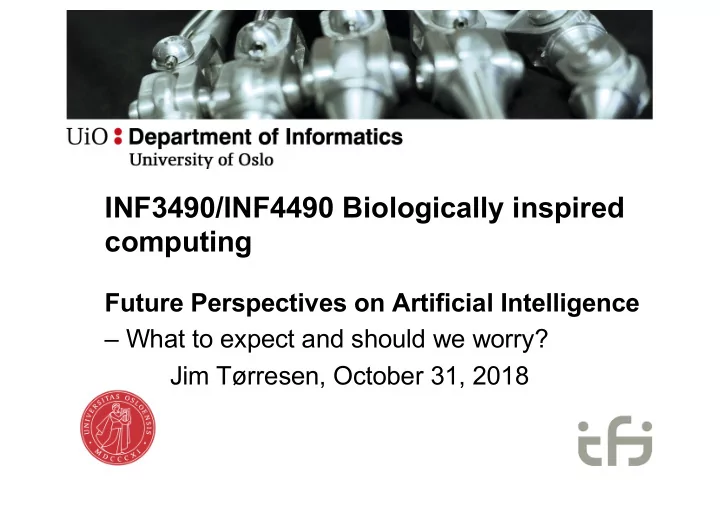

INF3490/INF4490 Biologically inspired computing Future Perspectives on Artificial Intelligence – What to expect and should we worry? Jim Tørresen, October 31, 2018
When and Where will a Breakthrough Come? • Technology breakthroughs often happens randomly and not linked to major initiatives and projects. • AI breakthroughs depend on the invention of scalable learning methods. – Need to understand more about how scalability and complexity arises in nature. • Contributors to progress in AI: – Researchers mimicking biological or medical phenomena. – Researchers solving engineering problems 2
CAM (Cellular Automata Machine) Brain 3
What Methods are Best? 4
Autonomous Systems • Systems that can operate with no or limited human control • Degrees of human control: – Full autonomy (human decides only the goal) – Remotely monitored (autonomous planning but human take over if the system is misbehaving) – Remotely operated (autonomous steering using human planning) – Remotely controlled (human take all decisions) 5
How Similar to Humans? • Similarity depends on progress in a number of fields such as AI methods, computing power, vision systems, speech recognition, speech synthesis, human-computer interaction, mechanics and actuators. • Design and usability will be essential for future robots but they should not necessarily be as similar as possible to humans (ref. u ncanny valley) . • We will see robots having human-like behavior , but not human consciousness . 6
In what ways can AI be helpful/good and what are the potential challenges? Input collected from students attending the class: • helpful/good: – Eliminate repetitive tasks for human – Solve diff problems – Better NLP • potential challenges: – Legal consequences – Personal data sharing – Eliminating jobs – Aligning goals with humans 7
Is Terminator Coming Close? 8
“Humans, limited by slow biological I am in the camp that evolution, couldn’t AI is our “biggest is concerned about compete and would be existential threat” super intelligence. 9 superseded by A.I.”
Ethical Risks of Developing AI Systems • People may become unemployed because of automation.? • We get too much free time.? • Artificial intelligence can be used for destructive and unwanted tasks.? (ref. “1984” George Orwell) • Successful KI can lead to the extinction of mankind? 10
Future Scenario with Autonomous Interacting AI Systems 11
Ethics for Artificial Intelligence • Designers must be aware of possible ethical challenges that should be considered – eg. protect sensor data, avoid misuse, and allow human inspection of functionality • The systems should themselves be able to do ethical decision making to reduce the risk of unwanted behaviour • Optional paper: 12 https://www.frontiersin.org/articles/10.3389/frobt.2017.00075/full
Ethics for Programmers • In the book “Moral Machines” it is argued that ethic competence should be included during program development by e.g. – machine learning methods based on examples of ethical and unethical behavior • Software that will replace human evaluation and social function should adhere to criteria such as – accountability (no. ansvarlighet) – inspectability – manipulation robustness – predictability (no. forutsigbarhet) 13
Self learning/Machine learning Algorithm Black box System to be designed vs Glass box Data set/ Somewhat transparent and understandable specification behaviour
What would you require of a robot to be used in your home? 15
16
Ethical Guidelines for Robots and their Developers (Asimov 1942) 1. A robot may not harm a human being , or through inaction, allow a human to be injured. 2. A robot must obey orders given by human beings except where such orders would conflict with the first law. 3. A robot must protect its own existence as long as such protection does not conflict with the first or second law. 17
Ethical Recommendations for Commercial Robots (Euronet Roboethics Atelier) • Safety: There must be mechanisms (or opportunities for an operator) to control and limit a robot's autonomy. • Security: There must be a password or other keys to avoid inappropriate and illegal use of a robot. • Traceability: Similarly as aircraft, robots should have a "black box" to record and document their own behavior. • Identifiability: Robots should have serial numbers and registration number similar cars. • Privacy policy: Software and hardware should be used to encrypt and password protect sensitive data 18 that the robot needs to save.
This lecture is based on a translation of the last chapter in an introductory book to artificial intelligence Innhold: • Kunstig intelligens og intelligente systemer • Problemløsning med kunstig intelligens • Evolusjon, utvikling og læring • Sansing og oppfatning • Bevegelse og robotikk • Hvor intelligente kan og bør maskiner bli? 19
Recommend
More recommend